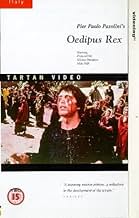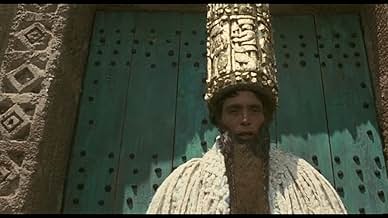IMDb-BEWERTUNG
7,2/10
7256
IHRE BEWERTUNG
Aus dem Verlassenwerden gerettet und vom König und der Königin erzogen, wird Ödipus immer noch von einer Prophezeiung heimgesucht - er wird seinen Vater ermorden und seine Mutter heiraten.Aus dem Verlassenwerden gerettet und vom König und der Königin erzogen, wird Ödipus immer noch von einer Prophezeiung heimgesucht - er wird seinen Vater ermorden und seine Mutter heiraten.Aus dem Verlassenwerden gerettet und vom König und der Königin erzogen, wird Ödipus immer noch von einer Prophezeiung heimgesucht - er wird seinen Vater ermorden und seine Mutter heiraten.
- Regie
- Drehbuch
- Hauptbesetzung
- Auszeichnungen
- 4 Gewinne & 4 Nominierungen insgesamt
Giovanni Ivan Scratuglia
- Sacerdote
- (as Ivan Scratuglia)
Laura Betti
- Jocasta's Maid
- (Nicht genannt)
Pier Paolo Pasolini
- High Priest
- (Nicht genannt)
Isabel Ruth
- Jocasta's Maid with a Lamb
- (Nicht genannt)
Empfohlene Bewertungen
Pasolini tells the drama of a man who knows his destiny from the beginning but does not accept the awareness of evil, tries to escape an atrocious future, but is inevitably entangled in it. The director uses Oedipus, of a classic archetype, to tell the human condition, the inadequacy of those who know they must die, but are unable to accept it.
The Moroccan setting that hides a fantasy Greece, between desert and villages of shepherds, mountains, cities built with clay and destroyed by plagues, is wonderful. A film written in images, dialogues reduced to the essentials, use of captions as in the silent era, intense photography and - for the first time in a Pasolini film - use of color that renders the ocher chromatism of the desert well.
The film have some substantial flaws, especially the storytelling. But the great Pasolini-style shine's brightly throughout the film and Franco Citti is just amazing as Edipo himself.
The Moroccan setting that hides a fantasy Greece, between desert and villages of shepherds, mountains, cities built with clay and destroyed by plagues, is wonderful. A film written in images, dialogues reduced to the essentials, use of captions as in the silent era, intense photography and - for the first time in a Pasolini film - use of color that renders the ocher chromatism of the desert well.
The film have some substantial flaws, especially the storytelling. But the great Pasolini-style shine's brightly throughout the film and Franco Citti is just amazing as Edipo himself.
Oedipus Rex: Oedipus Rex is a haunting experience. The final scene on the city streets is enchanting. The scene in which Oedipus kills three Roman guards is one of the finest tapestries of tension and viscera in cinema. The acting isn't worth mentioning; this film is Pasolini's triumph. It is mainly a triumph of striking and occasionally nauseating imagery. The shifts in time periods are rather tacky and simplistic in retrospect; they are done so gracefully though. The conclusion is pulled together with beautifully written dialogue that only Paolo Pasolini could deliver. The film is not one that is easily forgotten and is sure to be remembered for a long time.
The early and late sequences filmed within Italy are some of the best Pasolini has filmed. His confident and measured pace as well as his eye for composition and love of such basics as trees and sky and grass are a joy to behold. As for the rest, it can be very taxing. The Moroccan desert and mountain scenery is wondrous and the placing and movement of large numbers of peoples impressive but there is a lot of ponderous and somewhat languorous adherence to this titular tale. The associated screaming and passionate pondering as to the ins and outs of past events and just who did what with whom and for why become rather wearing.
one of films who remands. the rules of Greek tragedy. the limits of interpretation. the manner to use the myth as contemporary mirror. the art of Piero della Francesca. the conflict between past and present. a film of actors. because each trace of acting defines not the vision of Pasolini about the fate of king from Thebes but its search of truth. the truth - basis of all. Edipo re impress. for atmosphere, for costumes and the use of myth.the eyes of Franco Citti. the presence of Silvana Mangano. the first scenes who are parts from a possible Visconti. the end as warning about the price of fight against yourself. Edipo re is support for reflection. not a new version of well known myth because the important details of myth are insignificant. not example of high art. because it is far to be a show. it is only exploration of meanings. and the sketch about different forms of pride and sacrifice. looking for authenticity. precise definition of life.
Pier Paolo Pasolini's Oedipus Rex is a relatively faithful adaptation of Sophocles' Greek tragedy Oedipus the King. Beginning in 1920's Italy, a baby boy is born and is instantly envied by the displaced father. The setting then changes to ancient times, where a baby boy is being carried out into the desert by a servant to be left out to die from exposure. He is eventually picked up by a shepherd, who takes him back to the King and Queen of Corinth, who adopt the youngster and love him like one of their own. The child grows up to be Edipo (Pasolini's frequent collaborator Franco Citti), an arrogant youth who wishes to see the world for himself. And so he set out on the road to Thebes, the place of his birth.
Plagued by a prophecy that dictates he is destined to murder his father and marry his mother, Edipo is a tortured but intuitive soul. He murders a rich man and his guards after they demand he clear a path for them on the road, and later frees a town from the clutches of a Sphinx by solving its riddle. Staying true to his own recognisable style, Pasolini tells the story of Oedipus not with a sweeping narrative, but through a collection of comedic, violent and often surreal vignettes, the most bizarre and ultimately thrilling being the scene in which Edipo murders the guards. He runs away from them as they chase him, before charging at them one by one and cutting them down. It's a moment without any real motivational insight, offering but a glimpse into Edipo's damaged psyche.
Post-Freud, the story of Oedipus cannot be experienced without reading into the incestuous and patricidal undertones. But these themes are less explored by Pasolini than the idea of Edipo being ultimately responsible for his own downfall. Rather than the inevitability of fate, Edipo creates his own path, committing murder on a whim and marrying while blinded by ambition. For a bulk of the film, Pasolini keeps the audience at arm's length, favouring his own brushes of surrealism over a traditional narrative. While this may be occasionally frustrating - the pre-war scenes than book-end the film seem out of place and confusing - Citti's wide-eyed performance is a fantastic distraction, and the Moroccan scenery helps provide a ghostly, Biblical atmosphere as well as a beautiful backdrop.
Plagued by a prophecy that dictates he is destined to murder his father and marry his mother, Edipo is a tortured but intuitive soul. He murders a rich man and his guards after they demand he clear a path for them on the road, and later frees a town from the clutches of a Sphinx by solving its riddle. Staying true to his own recognisable style, Pasolini tells the story of Oedipus not with a sweeping narrative, but through a collection of comedic, violent and often surreal vignettes, the most bizarre and ultimately thrilling being the scene in which Edipo murders the guards. He runs away from them as they chase him, before charging at them one by one and cutting them down. It's a moment without any real motivational insight, offering but a glimpse into Edipo's damaged psyche.
Post-Freud, the story of Oedipus cannot be experienced without reading into the incestuous and patricidal undertones. But these themes are less explored by Pasolini than the idea of Edipo being ultimately responsible for his own downfall. Rather than the inevitability of fate, Edipo creates his own path, committing murder on a whim and marrying while blinded by ambition. For a bulk of the film, Pasolini keeps the audience at arm's length, favouring his own brushes of surrealism over a traditional narrative. While this may be occasionally frustrating - the pre-war scenes than book-end the film seem out of place and confusing - Citti's wide-eyed performance is a fantastic distraction, and the Moroccan scenery helps provide a ghostly, Biblical atmosphere as well as a beautiful backdrop.
Wusstest du schon
- WissenswertesFirst part of Pier Paolo Pasolini's "Mythical Cycle" also including Teorema - Geometrie der Liebe (1968), Der Schweinestall (1969) and Medea (1969).
- VerbindungenEdited into Dias de Nietzsche em Turim (2001)
Top-Auswahl
Melde dich zum Bewerten an und greife auf die Watchlist für personalisierte Empfehlungen zu.
- How long is Oedipus Rex?Powered by Alexa
Details
Box Office
- Weltweiter Bruttoertrag
- 2.364 $
- Laufzeit1 Stunde 44 Minuten
- Seitenverhältnis
- 1.85 : 1
Zu dieser Seite beitragen
Bearbeitung vorschlagen oder fehlenden Inhalt hinzufügen

Oberste Lücke
By what name was Edipo Re - Bett der Gewalt (1967) officially released in India in English?
Antwort
































